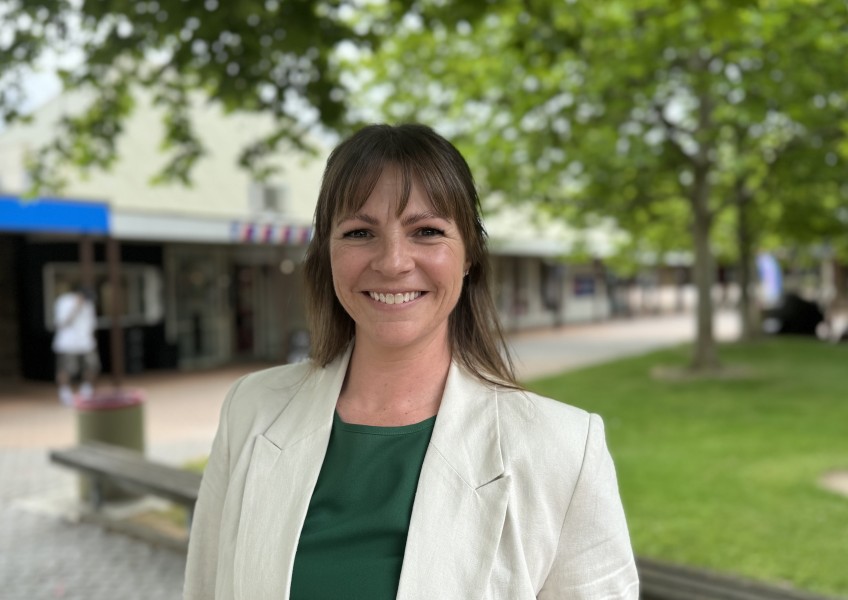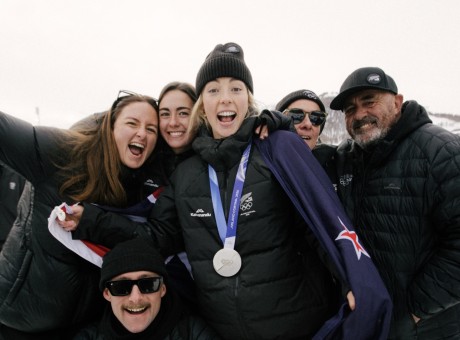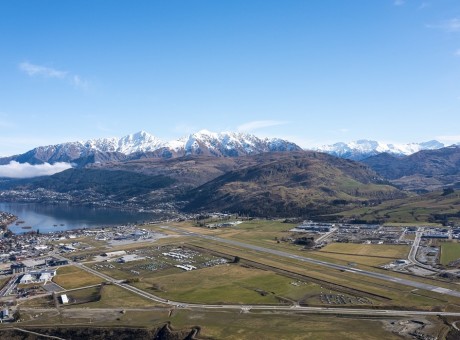CODC's Tamah Alley: Looking to escape from Tim Cadogan's shadow


Appointed mayor after Tim Cadogan's resignation, Tamah Alley says she has felt the expectation to be a "safe pair of hands" steering the Central Otago District Council.
At October's local body elections she’s hoping to retain the mayoralty, this time elected by the people, then look for ways to do things differently and, in her view, better.
Alley grew up near Oamaru and, after a variety of jobs, became a police officer in her mid-20s, spending 12 years as a sworn constable. She was elected to the Vincent Ward in 2019 and 2022 then thrust into the mayoralty in October when Tim Cadogan resigned to take up a position in Wellington at the Water Services Regulator.
If re-elected, she hopes to be able to make changes to how the council communicates and interacts with the public.
"I really want to lift the profile of council ... and make people feel a bit more like they own the council, like it's their council."
In fact, a "substantial increase in community engagement and feelings of ownership and investment in council decision making" is one of Alley’s top three priorities.
The others are cross-boundary partnerships to get the best, most efficient systems for water delivery, and ensuring any potential regional deal has a "Central Otago flavour".
Water delivery is a controversial topic dividing this year’s mayoral candidates.
In August, Central Otago, Clutha and Gore district councils formally committed to presenting a joint council-controlled organisation (CCO) in their Water Services Delivery Plans, due before Government by September 3. The councils will be shareholders and have a say in how services are delivered.
Southern Water Done Well is a proposed partnership between the three district councils to jointly manage and deliver stormwater, wastewater and water supply.
For Alley, it’s one of her greatest achievements during her time in council.
"I think the water conversation and getting the water CCO over the line is probably the thing that I think is going to have the biggest impact on future generations - In a positive way, despite there being some negative sentiment out there," she says.
"We’re such a small country. There's a lot of things that we can be smarter about by working together."
She says while it was a shock when Waitaki District Council pulled out of negotiations, it was important each council made the decision best for them at the time. Central Otago District Council has pre-approved Waitaki to join the CCO if they choose and Alley anticipates the CCO will add additional councils as the Water Service Delivery Plan deadline looms and plans are deemed compliant, or not.

Tamah Alley when sworn in as mayor last year. She says since then, she's been a safe pair of hands for the council.
Alley believes the biggest issue facing the District Council is central government reforms such as those around water meaning councils need to address decades of under-investment.
"Debt is a dirty word for most people, but for councils, it's actually the smart play," she says.
"It's about making sure that the decisions that we make are not just about the people of today. And recognising that times are really tough financially at the moment, but that's not to say they won't be tough in the future. We need to stop passing the buck or kicking the can down the road to the future generations."
Speaking of future generations, it comes back to making sure they also have a say which is why telling the council story is a key priority.
She hopes those engaging with the council can start to accurately reflect the community rather than be skewed to those who have the time to be engaged. But how do you achieve that when people are time poor and not interested - only 46.85% of the population voted in the 2022 elections.
"How we make sure people can understand what has become a really complex organisation?
"What we are responsible for goes so far beyond mowing lawns and fixing potholes, and putting a bore down to give everybody some town water. And what councils are going to be responsible for in the future is also going to change.
"My vision is really that more people understand what councils are and what they do, and more people feel invested in having a say."
Alley wants to explore the concept of citizens’ assemblies to bring people together for workshops so they can then make informed submissions. She has been talking to councils who have used this method and looking at overseas models.
"I think that's a way that you can really get a good spread of information back from people who have been informed.
"How you get the right people there? People who are going to turn up and be engaged in the process and do the homework. A big part of that is, I don't think you can always expect people to do that for free. In a lot of other places, the citizens' assemblies are kind of like a paid role."
On the topic of rates, Alley acknowledges double digit rates rises can’t continue. But she feels these have peaked and says the challenge is balancing community wants and needs with affordable rates.
"I think the community really wants to see a future vision for the council that recognises that our communities have aspirations around growth and improved quality of life. But they want to see those really carefully weighed with people's ability to pay rates."
In consultation for the latest Long-term Plan, she says it was apparent people didn’t want services reduced.
"We said, well, we could close a whole heap of halls and potentially save some money and they said, no, we want to keep all of those things."
People live in Central Otago because of its facilities like pools, an arts and culture scene and sports fields, she says.
"They don't come here to be able to drink lovely water and flush their toilet but those are the things that cost the most.
"A big part going forward will be diversifying council’s income streams, and I think we need a council that are forward thinking in that way."
She says this could include asset recycling, commercial land opportunities - including industrial land at Cromwell, Regional Deal negotiations that may result in a visitor levy and the Ratepayer Assistance Scheme.
"A full rates review will result in the way we allocate rates changing, to smooth the upward/downward trends that make it hard to budget rates."
Alley believes one driver of those double-digit rates rises is historic rates capping.
"Every 10 or 20 years or so you have this massive correction. That's what we've gone through and we're over that hump now and then we can start seeing that hopefully coming down."
She brings up the Ratepayer Assistance Scheme which the council voted to support a proposal for in June. The scheme would provide ratepayers with access to low-cost loans for things like rates, development contributions and some property improvements.
She also says there could be levers to pull during regional deal negotiations. This year Otago Regional Council, Central Otago District Council and Queenstown Lakes District Council agreed to take steps to develop a Regional Deal with Central Government. It proposes a mix of public and private funding to address public transport, energy needs, health care and other key issues for the district.
Affordable housing is also on the tip of tongues. Does the council have a role to play?
Alley says yes, and it’s already involved through provision of housing for elder people.
She also hopes any Regional Deal could help, perhaps in the form of a collaboration between Queenstown Housing Trust and Central Otago, and expansion of their mandate.
"But that's a conversation that will be completely predicated on the ability for us to form a really great partnership and relationship with them."
She says there’s also been interest in more affordable options at Cromwell’s Gair Estate.
"A big part of that is planning so that developers who are coming into the area know we're keen to see some variety that's going to free up more space for people to come in at different price points. That's an ongoing piece of work and forms obviously an entire pillar for the regional deal proposal."
It’s clear Alley is pushing for Central Otago as a district. But how would she make sure its individual communities all get a slice of the district council pie?
She says there’s always been a healthy, sibling-like rivalry between the communities in the district but there is still cohesion.
"There's an understanding, I think, that if Cromwell's doing well, all of Central Otago is doing well, and likewise for Alexandra and Vincent.
"Cromwell's got some astronomical growth coming in the future and we really need to be cognizant of that and make sure that what's happening in Cromwell protects the rest of Central Otago but also helps lift us up," she says.
"If Cromwell's surging ahead economically, it's good for everybody right through the Maniatoto and down into the Teviot Valley as well."
While the proposed fast-tracking of the Bendigo Mine is not really in council control, Alley says it could still have a lasting impact on the district so it’s important to be across it.
"A big part of that is being across as much as we can and making sure that if that is awarded consent by the fast-track process, that the consent conditions mean that Central Otago people will be protected now and into the future, regardless of what happens with any individual company running a mine."
Often council candidates make grand promises, then find they can’t fulfill them because they can't achieve a majority vote around the council table. It’s something Alley seems to understand.
"The purpose of being the mayor around the council table is not that you have the loudest voice, it's that you enable all the other voices to be heard. So that you can build a consensus that is the best middle point."
She says a council made up of different viewpoints is vital, and councillors must give and take to find consensus.
"The role of the mayor or the chair is to make that happen, not to drum up enough support to just get your view over the line."
For her, the first 100 days comes down to “building a cohesive team that are going to really deliver on results for the people of Central Otago".
"You can only do that if you have got a team player leading the council."
























